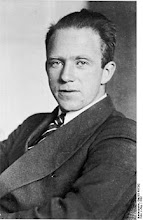I recently stumbled across one Dr. Robert Lanza who is the principle proponent of a metaphysical construct (I hesitate to use the term “theory”) known as “Biocentrism”. I jetted over to Wikipedia to read a brief outline of the concept and found what I would describe as something Timothy Leary and Neils Bohr might have dreamed up late one night over a cup of chamomile. As previously emphasized, I am just a humble wormhole repairman, which does not make me an expert on much of anything; after all, the guy who fixes your brakes is not necessarily a metallurgical engineer, but there was something oddly compelling about the shear cosmological arrogance of Dr. Lanza’s musings and something compellingly odd about the fact that there were actual qualified physicists who suggested they might have merit.
Biocentrism appears to be an elaboration upon the quantum observation problem, which is just a more formal articulation of the tree falling in the woods thing. Quantum mechanics is really complex and indecipherable, even for those who have made a profession of it, so it would be useless for me with my superficial understanding to attempt to provide clarity to the subject, but the question at issue is whether reality exists independent of an observer, or whether consciousness is a prerequisite for defining reality. Without even having to resort to Depak Chopra or Shirley McClain, there are perfectly reputable physicists who will tell you that probability wave functions really are collapsed by observation and that each resolution of a quantum state will create a whole new universe where the thing that happened here didn’t, or visa versa. This gives me great comfort since it means that somewhere in the paniverse one version of me is good-looking, rich and living in sin with Salma Hayek.
Dr. Lanza speculates that time and space are methods of perception, not external realities, eliminating distinctions between here and there, past, present and future, and alive and dead. He suggests not that consciousness is a property of the universe, but that the universe is a property of consciousness and therefore (to quote Wikipedia) “there is no absolute self-existing matrix in which physical events occur independent of life”. So, if we, or some other conscious beings, were not present in the universe, there would be nothing but an indeterminate probability cloud bereft of history or meaning, sort of like Sarah Palin’s brain.
Anyway, let’s pretend for a minute that we actually understand what all this is supposed to mean and that there are no problems such as defining “consciousness” or establishing how consciousness could evolve in a universe where nothing definitive is happening. My question is; who gives a rat’s ass? Don’t get me wrong; I adore scientific speculation and have an irrational faith in technology’s unproven ability to redeem human failure, but ultimately I think we are going to have to come to terms with the fact that our presence in this universe and its associated burden of consciousness is the only “fact” that really matters. We spend an inordinate amount of time examining the how and why of things, and when that results in cool stuff like organ transplants and life-like sex robots, all the better, but when it results in people blowing up the other people who have arrived at a different answer to the questions of how and why, or when people are so consumed by the speculation that they ignore the wonder of daily existence, well, then its just plain foolish.
Albert Einstein said that “a perfection of means, and confusion of aims, seems to be our main problem”. Albert was a very wise fellow, and the quote begs the question; when we figure this all out and have teased each and every secret from nature, will we be any closer to understanding anything than we are now? Dr. Lanza may be correct in at least one sense; whether his speculation reflects anything true about the physical realities of space and time, it is certainly true that we create our own realities through attitudes and actions and that the presence of each of us contributes to the reality of us all. Whether anything really means anything, much of it means something to me, and that is as real as it gets.
Wednesday, December 9, 2009
Subscribe to:
Post Comments (Atom)









No comments:
Post a Comment